Student Spotlight: Translating Theater and Acting in Paris
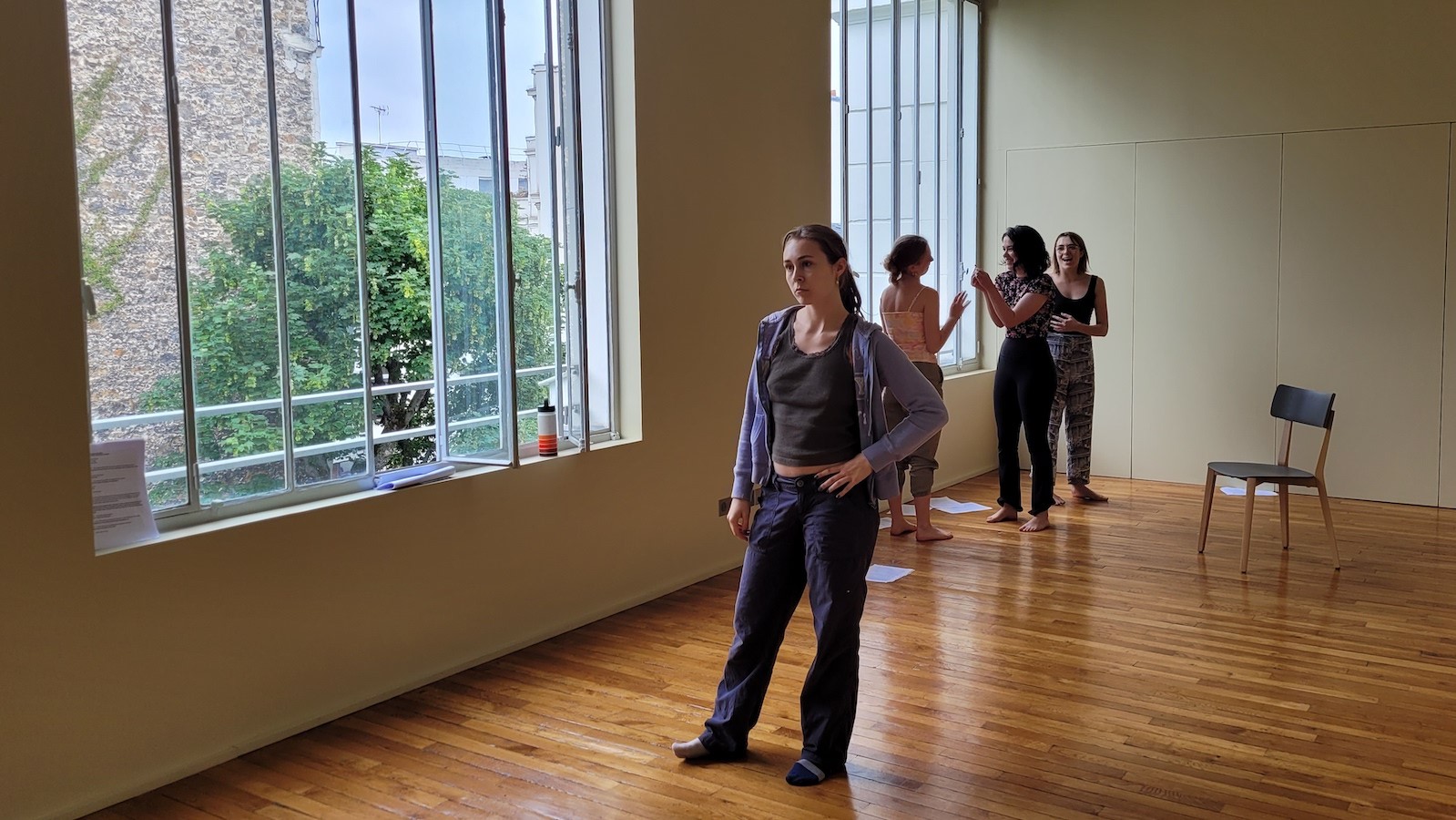
This summer at Reid Hall, Barnard’s Translating Theater and Acting in Paris programs are working in tandem to explore the world of contemporary French theater through immersive translation and performance practice. During the intensive five-week program, students ground their practice in the rich cultural life of Paris with regular outings to the Comédie Française, Les Bouffes du Nord, and Théâtre de la Ville, among others.
Professors Laurie Postlewate (French Department) and Gisela Cardenas (Theater Department) sat down with us this week to tell us more about this unique collaboration.
How did the collaboration between the Translating Theater and Acting in Paris programs come about?
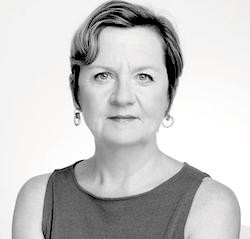
Laurie Postlewate: We’ve been translating theater at Reid Hall in the summer since 2017. From the outset, the course has been part of the translation program in the French department at Barnard, established by Peter Connor. There's a translation track of the French major, so students majoring in French can decide to do literature and translation; there is also a Minor in Translation Studies offered by the Comparative Literature Department. The Translating Theater program was conceived as a way to give the students a summer study abroad opportunity that would involve going to the theater, studying theater, and practicing translation. After a two-year Covid hiatus, I was planning to get the program back up and running when Gisela contacted me with the idea of working together.
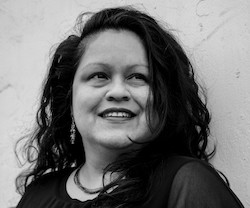
Gisela Cardenas: As a stage director and former actress, my training was done with people who studied with Ariane Mnouchkine at Théâtre du Soleil and Jacques Lecoq, so my training as a performer was extremely physical. Instead of starting with emotions or feelings, we started from the body, and that's always been a part of my DNA as a performer. Coming to Barnard, that was the kind of training I brought with me to share with my students. I was lucky enough to meet Laurie when Barnard interviewed me for the position, and that's when I learned that she was working in the French department and was interested in translation.
It's challenging to find contemporary French theater translated into English, and I want my students to have an understanding of other pedagogies outside of what we see in the United States. Last fall, I approached Laurie and said, "What about if we do a program with performers working in tandem with translators so they could translate Contemporary French theater plays into English, and we can perform the scenes?" That seemed a good idea. Also, not all of my students speak French, and I thought they might get inspired to learn French thanks to the experience here.
How are the programs structured? Are the students on two separate tracks or do they have classes together?
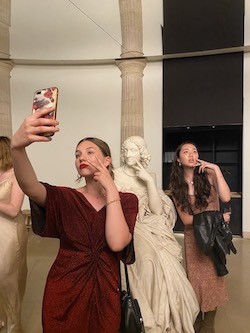
LP: Yes, there are two separate tracks. We just began last week and so far we've been working separately so far, but we will begin working together by the end of this week. My students translated a set of scenes from “L’Avare”, which Gisela then distributed to her students and they are now working on preparing them for performance. My students have now almost finished a second round of scenes and the acting students are going to do those, but in more of an improvisational way.
GC: Exactly, the first scenes are going to be more staged and memorized, and the second scenes are going to be read and improvised in the moment with the text at hand, which is another strength I find useful for a performer to have. Making a scene, and digging deeper into it, takes time. Both classes want translators and performers working together on a play to see how the translation feels, how the performance feels, and to understand the influences needed to make a text active for the stage.
Why is theater translation so important?
LP: Theater translation is important for translation studies overall because when you translate theater, you're going through a process of adaptation that happens in all kinds of translation, but, for theater, it’s on a much more visible level. This involves really thinking about the context, the purpose and the audience of the target text. Student translators often have a hard time letting go of the idea of staying faithful to the original text. With theater it becomes quickly obvious that faithful translations don’t work: the context, the audience, the intentions of the director all come into play. This adaptation happens in all kinds of translation, but it's just not as obvious. So theater translation is a great way to actually train translators. The fact that we go to see the plays, that only enhances this idea that multiple interpretations of the plays exist.
Before this collaborative experience with “Acting in Paris” as a partner course, my students did do readings of their material out loud – but it's very different to actually translate it then give it to actors. I think this will add a whole other dimension for the translators that's really important.
GC: Yes, for example, today, the performers were reading what they'd received and noticed patterns of thought, word repetition, and rhythms offered by the translators. They're starting to make small suggestions as well, and, in some cases, they are figuring out how a more literal translation can be updated and made more meaningful at present. Working in tandem with the translators helps the performers exercise their muscles for collaboration.
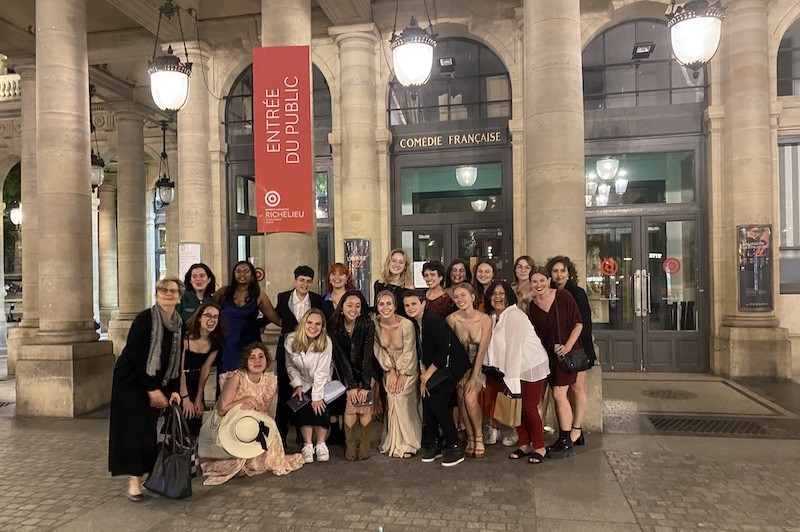
How are actors, who don't necessarily speak French, learning from the plays you see?
GC: That's precisely the point. The problem is that much of contemporary theater has started to think that theater is just words, when actually, if the theater is going to survive, it has to be about the event of the co-presence and whatever meaning you can get beyond words. Now, my students are starting to see the proof of that here in Pais because they realize, "Oh, I got it! I feel something as an audience member. I don't understand the words, but I can connect emotionally with them." As a performer, it is essential to understand that it's not only what you say but how you say it, how you move, and the context of the relationships you are playing on stage. Theater doesn't happen in the individual. It occurs in the space between performer's bodies and between them and the audience. I always tell my students that I can always read the play at home with my cat and a glass of wine. If we choose to go to the theater, it is to see the visual and aural poetry happening in real-time on stage.
Will you continue the collaboration back on campus?
LP: Our hope is to eventually be able to take the material that we've worked on in the summer and do some sort of production during the year on campus. We have to figure out what that would entail in regards to performance rights, so it may not happen this year but I think that by the next round we should be able to do it.
GC: I would love to direct a show back that we've seen and worked on during class here so that people on campus can become more familiar with contemporary French theater. Obviously, the issue of the author's rights and other details will have to be explored, but that is one of my goals with the program.
